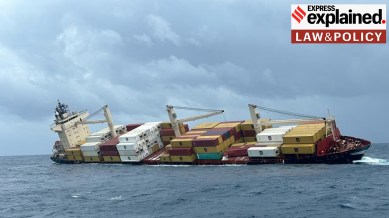An award-winning journalist with 14 years of experience, Nikhil Ghanekar is an Assistant Editor with the National Bureau [Government] of The Indian Express in New Delhi. He primarily covers environmental policy matters which involve tracking key decisions and inner workings of the Ministry of Environment, Forest and Climate Change. He also covers the functioning of the National Green Tribunal and writes on the impact of environmental policies on wildlife conservation, forestry issues and climate change. Nikhil joined The Indian Express in 2024. Originally from Mumbai, he has worked in publications such as Tehelka, Hindustan Times, DNA Newspaper, News18 and Indiaspend. In the past 14 years, he has written on a range of subjects such as sports, current affairs, civic issues, city centric environment news, central government policies and politics. ... Read More
Ship ‘arrested’ after Kerala claims damages: How do admiralty suits work?
The order came after the Kerala government filed an admiralty suit — a legal proceeding pertaining to maritime law and disputes — in the High Court.

The Kerala High Court on Monday ordered the conditional “arrest” of Liberian container ship MSC Akiteta II, currently anchored at Thiruvananthapuram’s Vizhinjam port, over compensation claims arising from the sinking of the MSC Elsa III in May.
The order came after the Kerala government filed an admiralty suit — a legal proceeding pertaining to maritime law and disputes — in the High Court. The suit named the Mediterranean Shipping Company, one of whose firms operates and manages the MSC Akiteta II. Another company of the same group operated the MSC Elsa III.
monthly limit of free stories.
with an Express account.
The government has sought compensation of Rs 9,531 crore for the alleged pollution of Kerala’s marine ecosystem due to the sinking of MSC Elsa III on May 25, around 25 km southwest of Alappuzha.
The ship went down with more than 600 containers, some of which carried plastic pellets, hazardous substances, and diesel.
What law governs maritime disputes?
The Admiralty (Jurisdiction and Settlement of Maritime Claims) Act, 2017 governs maritime disputes in India. Under the Act, admiralty suits can be filed for maritime claims such as damage to ships, ownership and agreement disputes, loss of life, wage issues, and environmental damage.
The 2017 law replaced the colonial-era Admiralty Court Act, 1861, and Colonial Courts of Admiralty Act, 1890.
The previous laws gave jurisdiction only to the High Courts of Bombay, Calcutta and Madras, as these were the only major ports in India earlier. Now, the HCs of Kerala, Karnataka, Odisha, Telangana and Andhra Pradesh also have jurisdiction over maritime disputes.
The jurisdiction of the courts extends up to the territorial waters of their respective jurisdictions. The limit of territorial waters is up to 12 nautical miles from the nearest point of a low-water line along the coast. This also includes the seabed, subsoil (the layer of soil under the topsoil on the surface), and airspace above it.
What does the law say about claims over environmental damages?
The Kerala government has sought compensation for environmental damage under Section 4 of the Admiralty Act. This section states that the HC “may exercise jurisdiction to hear and determine any question on a maritime claim, against any vessel, arising out of…damage… caused by the vessel to the environment…; measures taken to… remove such damage; compensation for such damage,” etc.
Apart from the Admiralty Act, other laws too address issues of compensation and accountability in such cases. Under the Merchant Shipping Act, 1958, ship owners are liable for oil pollution damage in the event of leaks. The Environment Protection Act, 1986 empowers authorities to take action against polluters.
The National Green Tribunal (NGT) can also be approached to seek environmental compensation. In 2016, the Tribunal ordered a Panama-based shipping company to pay Rs 100 crore in damages for an oil spill after its vessel M V Rak sank off the Mumbai coast in 2011.
So what does Kerala’s admiralty suit say?
The Kerala government’s admiralty suit sought the arrest of the MSC Akiteta II until compensation was paid to the state. In maritime law, the arrest of a ship refers to a legal procedure where a court or other competent authority detains a vessel to secure a maritime claim against it or its owner. The court found merit in the maritime claims of the Kerala government, it ordered the detention of the MSC Akiteta II until Rs 9,531 crore was deposited or security was furnished by the owners of the vessel.
“It is averred in the plaint that the damage occurred on account of oil pollution caused by the said vessel and pollution caused by the cargo in 643 containers carried in the said vessel. It is averred that the compensation is computed in accordance with the Central Pollution Control Board Guidelines,” the court order said.
Of the Rs 9,531 crore claim, Rs 8,626.12 crore has been sought for environmental damage caused due to the sinking of MSC Elsa III, and Rs 378.48 crore for the remediation work to minimise, prevent or remove the damage caused to the environment by the capsized ship. An amount of Rs 526.51 crore has been sought for economic losses caused to fishermen in Kerala.